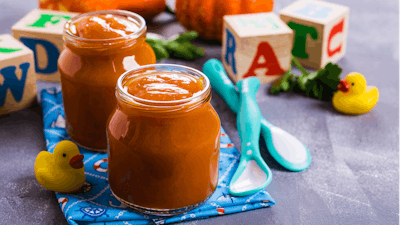
A congressional investigation has found levels of arsenic, lead and other toxic metals that can harm brain development in many popular baby foods, including organic brands.
In a report released Thursday, a U.S. House Subcommittee said it requested internal data from seven companies, including Walmart, in 2019 after a nonprofit called Healthy Babies Bright Futures published results of testing it did on baby foods.
Four of the companies — Gerber, Beech-Nut, Earth’s Best Organics maker Hain Celestial and Happy Family Organics maker Nurture Inc. — shared documents. The subcommittee said Walmart, Sprout Foods and Campbell Soup Co., which makes Plum Organics baby food, didn’t cooperate.
Arsenic, lead, cadmium and mercury — metals that the U.S. Food and Drug Administration considers harmful to human health — can remain in the environment for decades from past pesticide and herbicide use, according to Michael Hansen, a senior staff scientist with Consumer Reports.
Toxic metals might be more common in baby foods because of the vitamins and minerals added to those foods during processing, he said. Rice, a common ingredient in baby foods, also tends to have high levels of arsenic. Rice is grown in water, and arsenic from the soil dissolves when it comes in contact with water, he said.
Because babies' brains are still developing, there is a lot of concern about how those metals could damage that development, Hansen said. By the time symptoms like behavioral problems show up, it can be difficult to trace them back to foods, he said.
Hansen said parents who are concerned should switch to unprocessed fruits and vegetables. The FDA also recommends feeding babies a variety of grain-based cereals, not just those made with rice.
Last August, the FDA finalized guidance for infant rice cereal, recommending it contain no more than 100 parts per billion of arsenic. The subcommittee’s report said Beech-Nut used some ingredients that tested as high as 913 parts per billion for arsenic, while Earth’s Best Organics used ingredients testing as high as 309 parts per billion for arsenic.
The report found some instances where manufacturers tested ingredients but not final products, even though levels of toxic metals might be higher in the finished products. It also found instances where manufacturers set internal standards but still sold foods that exceeded them.
The subcommittee, which is led by Rep. Raja Krishnamoorthi, an Illinois Democrat, said it wants the FDA to set standards for the presence of heavy metals in baby foods. Manufacturers should be required to test finished products and publish the results, the subcommittee said in its report.
In a statement Thursday, the FDA said it takes exposure to toxic elements in the food supply very seriously. The agency said baby food makers have made progress in reducing arsenic in baby food since 2016, when it first proposed setting the 100 ppb guidance.
“We acknowledge that there is more work to be done, but the FDA reiterates its strong commitment to continue to reduce consumer exposure to toxic elements and other contaminants,” the agency said.
Campbell Soup Co. said it did respond to the subcommittee's questions. In that submission, it noted that the FDA doesn't have standards for heavy metals in baby food. But it said its testing shows that metals in its baby foods are within acceptable limits.
Walmart also said it reached out to the subcommittee, but made clear that any product testing would be managed by its suppliers.
Happy Family Organics said it was disappointed in the report, which it said didn’t make clear that metals and minerals are found in trace amounts in many foods. Happy Family also said the test results it provided in 2019 don’t reflect all of the current products.
Earth’s Best Organics also said the report referenced outdated data. The brand said it removed brown rice from its products, changed other ingredients and expanded testing of finished products after a meeting with the FDA last year. Beech-Nut said it is still reviewing the report, but assured parents its baby food is “safe and nutritious.”
A message seeking comment was left with Gerber.
Hansen said the FDA should require baby food companies to test the final products and make the results available, particularly for organic brands.
“You can’t just allow the companies to do their own thing,” he said.






















